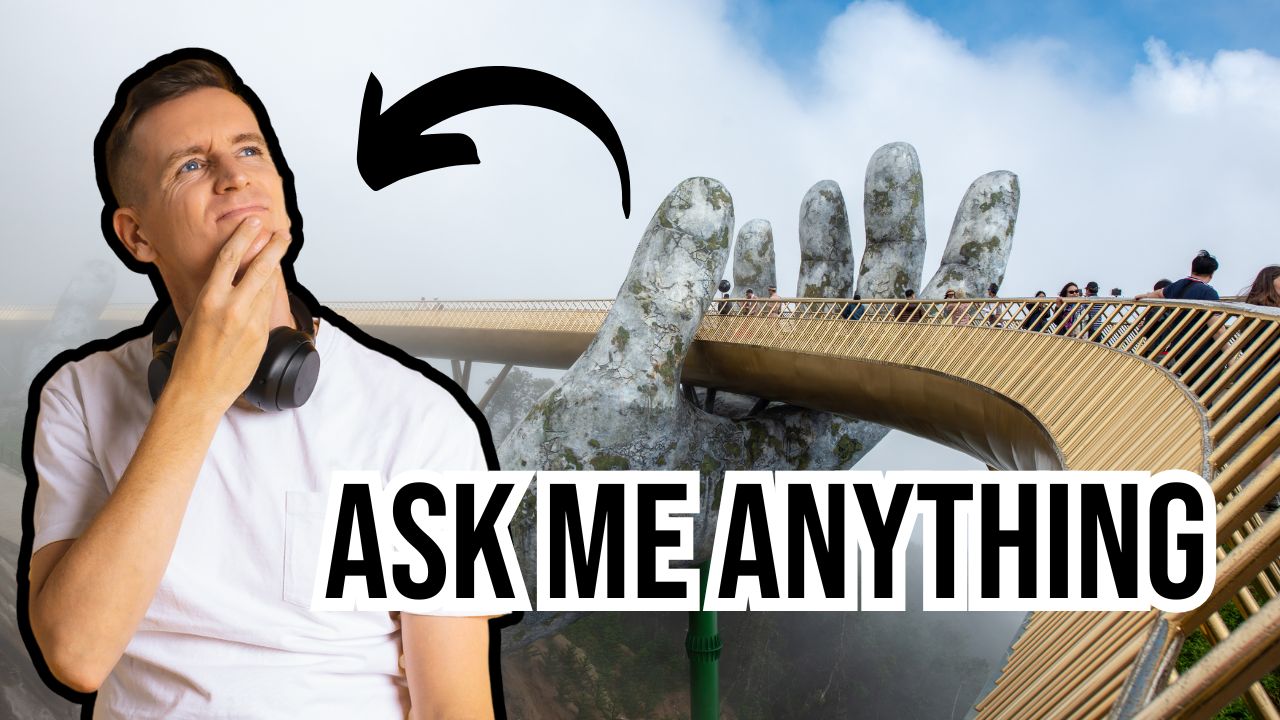This is another episode in which I interviewed my friend – Mischa Smith. Hey there! Welcome to a special blog post inspired by my first-ever AMA (Ask Me Anything) episode of A Vietnam Podcast. It’s a bit different this time—no guest interviews or deep dives into Vietnam. Instead, it’s just me, Niall Mackay, answering your burning questions. Whether you’re curious about the podcast journey, expat life, or just want to know what it’s like living in Vietnam, you’re in the right place. Let’s jump in!
How It All Started: My Journey to Vietnam
Back in 2015, I visited Vietnam with my wife Adrie for what was supposed to be a simple vacation. But as they say, Vietnam has a way of pulling you in. We fell in love with the country’s vibrancy, culture, and the warm-hearted people. We went back to New Zealand, but our minds were set—we had to return. And in 2016, we did just that. We came back to Vietnam to teach English, planning to stay a year. Well, one year turned into two, then four, and now nearly a decade later, here we are—still in Saigon, still loving it.
Saigon isn’t just a place where I live—it’s become home. It’s where I started my podcast, where I found my passion for storytelling, and where I’ve connected with so many incredible people.
Podcasting 101: How I Create A Vietnam Podcast
One of the first questions I got from listeners was all about the tech: “Do you use Riverside to record your podcasts online?” The answer? Nope. I’ve never used Riverside. Instead, my go-to is Descript. It’s a great tool that allows me to edit and record everything in one place. My team and I use it for all of our podcasts, whether it’s my own show or the ones we produce for others.
I started A Vietnam Podcast with one microphone and GarageBand on my Mac. I didn’t have any big plans—it was just a fun hobby, a way to share stories of the people I met in Saigon. Fast forward a few years, and now I’m running an award-winning podcast production business. If you’d told me this six years ago, I probably would have laughed. But here we are!
Adapting to Life in Vietnam: The Good, the Bad, and the Unexpected
When you move to a new country, you pick up some habits—some good, some… well, questionable. Here are a few that have surprised even me:
- Drinking Beer in the Streets: Yep, you heard that right. In Vietnam, it’s totally normal to grab a beer and walk down the street with it. Try doing that back in the UK or New Zealand, and you’d get arrested!
- Driving Like a Local: The roads in Vietnam can be chaotic, and sometimes, you’ve got to adapt. I’ve found myself driving down the wrong way on a street just because it’s quicker—something I never thought I’d do. It’s all about survival out here!
- Plastic Use: Despite my best efforts, I’ve definitely used more plastic here than I would back home. I try to carry my metal cup for coffee, but there are times when convenience wins out.
- Speeding at Traffic Lights: They have countdown timers on traffic lights here, and I’ve picked up the habit of speeding up when the numbers start to drop. It’s one of those things that makes total sense until you realize, “Maybe I shouldn’t be doing this…”
- Embracing Local Breakfasts: Back home, breakfast meant cereal or toast. Here? It’s not unusual to have a pork chop or beef stew in the morning. And honestly, I love it. If I ever asked my mum for pork and rice for breakfast, she’d think I’d lost the plot!
Winning Awards and Finding Unexpected Success
One of the highlights of my podcasting journey has been winning the “Best Interview Podcast in Asia” and the “Audio Producer of the Year” award. It still feels surreal. I decided to nominate myself, thinking, “Why not? What’s the worst that can happen?” And then I won—twice! It’s one of those moments where you feel validated, like maybe, just maybe, you’re actually pretty good at what you do.
The Red Lines podcast I worked on was a big part of winning that award. It was the first time I got to really create a narrative-driven story, adding in music, moving pieces around, and shaping the story. And when the hosts actually recorded some of my script suggestions word for word, I realized, “Wow, they trust me.” It’s those moments that make all the late nights and editing worth it.
Vietnam Then and Now: How Things Have Changed
Living in Vietnam for almost a decade, I’ve seen some major changes, especially in Saigon. There are more buildings, more roads, more cars. It’s a different city from when we first arrived. I often think about how much the younger generation has changed too. The kids who were 10 years old when I arrived are now in their late teens or early twenties, and their world is so different from the one I stepped into.
Change is a double-edged sword, though. It’s brought better infrastructure, more opportunities, and a stronger economy. But it’s also come with challenges like pollution and the destruction of green spaces. It’s hard not to feel nostalgic sometimes, but I always try to remember that progress is important—especially when it means a better future for the Vietnamese people.
The Most Memorable Podcast Moment
One of the most unforgettable stories I’ve ever heard on the podcast came from Suzanne Thi Hien Hook. She was abandoned under a bush during the Vietnam War as a baby and later adopted by a British family. Her childhood, though, was far from the fairy tale it appeared to be. She told me that she never knew what it felt like to be loved as a child, and I have to admit—I cried during that interview.
It made me reflect on my own upbringing. I realized how lucky I was to have always felt loved, even during tough times. After that interview, I called my parents to thank them for giving me that sense of love and security. It’s moments like these that make podcasting so much more than just a job—it’s about connecting with people on a deeper level.
Life as an Expat: Advice for Newcomers
If you’re thinking about moving to Vietnam, I’ve got some advice for you: Do your homework before renting a place. Make sure to visit the neighborhood at different times of day to check for things like construction noise or nearby schools. Trust me, you don’t want to find out about that rooster outside your window at 6 a.m. after you’ve signed a year-long lease.
Also, don’t forget to sort out your health insurance, and know that building a social circle takes time. Vietnam’s expat community can be transient, with people coming and going every few years. It’s tough to say goodbye to friends, but the energy of this place makes it all worth it.
Wrapping Up: Why I Love Vietnam
Living in Vietnam has changed my life in so many ways—from starting a podcast to trying new foods and adapting to a completely different culture. It’s not always easy, but it’s always an adventure. And that’s why I’ve stayed for nearly a decade and don’t plan on leaving anytime soon.
So, whether you’re a long-time listener or just discovering A Vietnam Podcast, I hope this AMA episode and blog post give you a better glimpse into my world. If you want to get episodes like these early, or just be part of a community of people who love Vietnam as much as I do, join us on Patreon.
And if you liked this post, do me a favor—share it with a friend, subscribe to the podcast, and let’s keep the conversation going. Thanks for being part of the journey!

